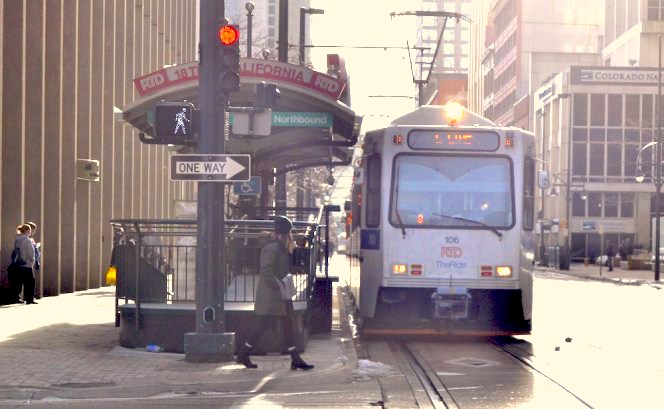Westword Misses the Point of the L Line

On Monday, Westword ran a piece by reporter Teague Bohlen trashing RTD over the new L Line and its impact on service. It’s good to have your eyes peeled for backdoor service reductions, but this isn’t one of them: The L Line service pattern should make Denver’s light rail system more reliable for all riders.
The reason the L Line was split off from the D Line is all about reliability, as Streetsblog reported last week. Northbound D trains were causing cascading delays throughout the system because they had to wait for southbound D trains to clear a one-track section. The L Line’s simpler route will help prevent those bottlenecks.
But Bohlen didn’t even mention the single-track section along Welton Street that was knotting up the D Line and causing delays to ripple out to other lines. With the L Line preventing those delays, riders who use the downtown loop now stand to save time.
Technically, Westword’s headline — “RTD Reduces Light Rail Service to Five Points and Beyond” — isn’t wrong. The L stops running about an hour before the old D did because RTD must funnel limited resources to routes with the highest ridership. About 20 to 30 people will be negatively affected daily, RTD rail service planner Eric Miller told Streetsblog. But the shorter service hours weren’t even the basis for Bohlen’s assertion that service will get worse — he didn’t touch on that at all.
Instead, Bohlen calls the change “bewildering” and “short-sighted” because L riders now have to transfer if they’re traveling between 30th and Downing and stations south of 16th Street. These riders, he claims, will lose “well over three days of their lives” each year, but his arguments don’t hold up.
L riders will usually wait three to six minutes to connect to D trains, Miller told Streetsblog. (This information is also contained in publicly available RTD schedules.) But Bohlen posits that passengers will be delayed “maybe 10 minutes” each way. “Get off the train, maybe walk a block to where you can catch the next train, make sure to keep your transfer ticket, swipe it at that next stop, get on that train, keep going,” Bohlen imagines.
It’s a sentence loaded with wrong: Passengers don’t have to walk anywhere — the L, D, F, and H lines all serve the same stations in question. Bohlen should know this, because in 2016 he told us all how often he takes the D from 30th and Downing. Also, swiping a “transfer ticket” is not a thing on RTD light rail.
Later in the piece, Bohlen evokes redlining, or government sanctioned racial discrimination, because Five Points is a historically black neighborhood. He asserts that “reductions in service like this one invoke those uninvited ghosts all over again.” It’s an irresponsible statement, to say the least, given the systemic benefits of improved reliability that the L Line is supposed to deliver.
If the new service works as planned, trip times will be more predictable and riders — including L train riders who have to make transfers — won’t have to deal with as many aggravating unplanned delays as they do today.
RTD has a lot of problems. It lacks the resources to operate as much service as Denver needs, and its governance structure favors car-centric suburbs over the city.
The decision to split off the L Line from the D Line is not one of those problems — in fact it’s a pretty clear case of agency staff taking initiative to make things better for riders. Miller said he’d been trying to fix the delays caused by the one-track section on Welton for more than five years! If anything, the question should be what took RTD so long to do something.
If we want better transit service in Denver, we need to generate pressure in the right places. Instead of ragging on service planners for doing their job well, let’s hold Mayor Hancock’s feet to the fire to deliver the transit improvements Denver residents desperately need: funding for more Denver-centric RTD service, transit priority at intersections so riders don’t lose so much time at red lights, and more dedicated right of way on our streets to speed up buses and trains.


